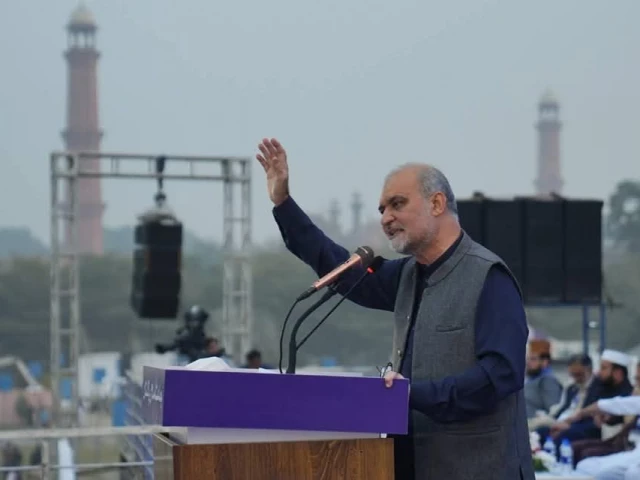Party’s three-day annual congregation begins at historic Minar-e-Pakistan in Lahore
JI chief Hafiz Naeemur Rehman addresses the opening session of the party’s three-day congregation which begins at the historic Minar-e-Pakistan in Lahore. Photo:X
Jamaat-e-Islami leader Hafiz Naeemur Rehman said the current political and constitutional unrest over the 27th Constitutional Amendment has intensified public anxiety and created new challenges to citizens’ fundamental rights and governance structure. He added that his party did not seek power through conspiracies and would not participate in any non-transparent electoral process.
Addressing the opening session of the party’s three-day annual congregation at the historic Minar-e-Pakistan in Lahore, he said Pakistan, at this critical juncture, needed clear leadership and unwavering constitutional supremacy so that every citizen could feel part of a just and equitable system.
Describing the gathering at Grand Iqbal Park as a symbol of unity, Naeem noted that thousands of participants from across the country had made it a disciplined congregation of unparalleled magnitude. He said the organizational standards demonstrated at the site reflected the tireless work of thousands of volunteers, ensuring facilities for all participants, including women, and creating an administrative model that he believed no political party or government could replicate.
Referring to the ideological and historical foundations of the JI, he said the movement initiated by Syed Abul A’la Maududi had evolved into a large-scale effort dedicated to establishing a just social order. He stressed that JI should not be seen simply as a political party driven by vested interests or controlled by influential families or institutions, but rather as a religious and social movement committed to serving across sectarian and communal divisions.
Read: Faisalabad factory explosion kills 20, director, staff arrested as owner flees
Commenting on global politics, Naeem criticized the concentration of economic power in the hands of a small global elite and highlighted what he described as destabilizing US policies.
He said protracted wars and unwavering support for Israel had worsened humanitarian crises in several regions, while the use of the veto at the international level had obstructed justice for oppressed communities. He argued that no unjust system could continue indefinitely and urged the Muslim world, including Pakistan, to play a more active role in shaping a more just world order.
Speaking on Kashmir and Palestine, the JI chief said Pakistan must continue to maintain its principled stand while asserting that the JI has always supported the state in difficult times even when the party disagreed with the establishment. He added that there could be no compromise on Kashmir and that the Palestinian issue had long been at the heart of political discourse in the subcontinent.
Discussing national governance, Naeem argues that Pakistan’s system remained for decades in the grip of entrenched power structures that limited citizens’ rights. He said the combined influence of landlords, capitalists and bureaucracy had deprived ordinary people of education, employment, justice and inheritance rights.
Read also: KP CM slams Punjab for mistreatment of Imran Khan’s sisters
He said deep-rooted class divisions have undermined children’s education and women’s rights, slowing national progress. The JI chief criticized state neglect of regions such as Balochistan, Khyber-Pakhtunkhwa and Sindh, linking lingering local grievances to long-standing administrative failures.
He added that the JI would continue to defend the interests of farmers, workers and youth on all platforms. He also highlighted the recurring agricultural crisis in Punjab and what he called the nefarious role of various mafias.
Pakistan, he stressed, does not belong to a single individual but to millions of people who sacrificed for independence. To bring the nation out of despair, he said a comprehensive political and social road map would be announced on the third day of the congregation, and the movement would then continue across the country.
He concluded that Pakistan could not progress without a fair system and no force could stand in the way of the unity of the public once they had chosen to assert their rights. The session was also addressed by Jamaat-e-Islami Deputy Chief Liaquat Baloch, Dr Osama Razi, General Secretary Ameer ul Azeem and others. Thousands of participants, including women and children, have come from all over the country to attend the congregation, which will conclude on Sunday afternoon.




